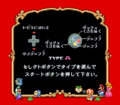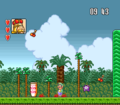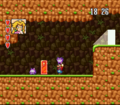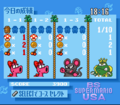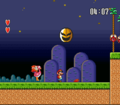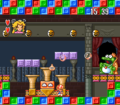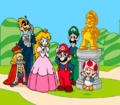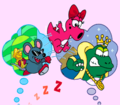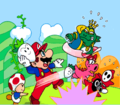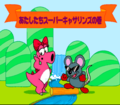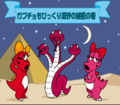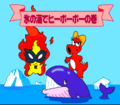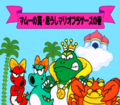BS Super Mario USA: Difference between revisions
DoomMan899 (talk | contribs) |
No edit summary Tags: Mobile edit Advanced mobile edit |
||
| (166 intermediate revisions by 58 users not shown) | |||
| Line 1: | Line 1: | ||
{{ | {{Another language}} | ||
|image = | {{italic title}} | ||
|developer = Nintendo EAD, [[St.GIGA]] | {{game infobox | ||
|publisher = [[Nintendo]] | |image= | ||
| | |developer=[[Nintendo Entertainment Analysis and Development|Nintendo EAD]], [[St.GIGA]] | ||
|publisher=[[Nintendo]] | |||
|release={{flag list|Japan|1996}}Part 1 - March 31<br>Part 2 - April 7<br>Part 3 - April 14<br>Part 4 - April 21 | |||
|genre = Platform | |genre=Platform | ||
|modes = Single player | |modes=Single player | ||
|ratings = | |ratings= | ||
|platforms = [[ | |platforms=[[Super Nintendo Entertainment System|Super Famicom]] | ||
| | |format={{format|bsx=1}} | ||
|input = {{input|snes=1}} | |input={{input|snes=1}} | ||
}} | }} | ||
'''''BS Super Mario USA''''' is a direct sequel to ''[[Super Mario Bros. 2]]'' (known as ''Super Mario USA'' in Japan) for the [[Satellaview]], an add-on for the [[Super Nintendo Entertainment System|Super Famicom]]. It was the first platform game of the [[Super Mario (franchise)|''Super Mario'' franchise]] to make use of the Satellaview's Soundlink features. The gameplay and [[level]]s are essentially the same as in the ''[[Super Mario All-Stars]]'' version of ''Super Mario Bros. 2'' but with numerous added features and a new plot, presented as a sequel to the original game. | |||
==General information== | |||
[[File:BSSMUSA Mariostatue.png|frame]] | |||
The game was released in four installments. In each one, the player is sent to a different ''Super Mario Bros. 2'' "world". The goal is seemingly to collect the [[Ōgon no Mario Zō|golden Mario statue]]s located in each level, defeat the [[list of bosses|boss]], and then find and beat [[Wart]], who can be battled in any world when going down in any [[jar]] while the player is in [[Subspace]]. The player can select the levels in any order and return to the levels as often as desired until the "episode" ends at 50 minutes on the clock. | |||
As the gameplay episode progressed, an audio drama would stream via [[St.GIGA]]'s Satellite radio, which would tell the narrative of the story. | |||
As the gameplay episode progressed, an audio drama would stream via St. | |||
==Plot outline== | ==Plot outline== | ||
After the events of ''[[Super Mario Bros. 2]]'', [[Mario]] and friends believe [[Subcon]] is all a dream and move on. However, [[Wart]] returns and overthrows the [[Ōsama|King of Subcon]] in the heroes' absence. Mario and his friends must once again face the forces of Wart, including the [[Birdo]] trio, [[Mouser]], [[Tryclyde]], [[Fryguy]] and [[Clawgrip]]. Both the protagonists and their foes can use the power of the stars ([[Satellaview|satellites]]) to their advantage. In addition, Mouser has stolen the golden Mario statues, symbols of peace, and hid them throughout Subcon.<ref name=SatellaviewLibrary>{{cite|language=ja|url=ameblo.jp/satebo/entry-12607963518.html|title=BSスーパーマリオUSA パワーチャレンジ|date=July 18, 2020|publisher=Ambelo|accessdate=July 2, 2024}}</ref> | |||
==Release information== | |||
==Release | |||
Being episodic, ''BS Super Mario USA'' was released on a weekly basis. | Being episodic, ''BS Super Mario USA'' was released on a weekly basis. | ||
The four episodes were premiered during these weeks: <ref> | The four episodes were premiered during these weeks: <ref>{{cite|deadlink=y|archive=web.archive.org/web/20170913170501/http://www.f3.dion.ne.jp/~kameb/satella/st_slg.htm|title=サウンドリンクゲーム一覧|language=ja|publisher=www.dion.ne.jp|accessdate=July 2, 2024}}</ref> | ||
{|style="text-align:center;width:100%"class=wikitable | |||
{| style="text-align: center; width: 100% | !width="15%"|Date/date dange | ||
!width="25%"|Japanese | |||
!width=" | |||
!width=" | |||
!width="25%"|Rōmaji | !width="25%"|Rōmaji | ||
!width="25%"|Translation | !width="25%"|Translation | ||
!width="10%"|World | |||
|- | |- | ||
|1996/03/31~1996/04/05 | |1996/03/31~1996/04/05 | ||
|BSスーパーマリオUSA パワーチャレンジ 第1回 「あたしたち、スーパーキャサリンズ」の巻 | |BSスーパーマリオUSA パワーチャレンジ 第1回 「あたしたち、スーパーキャサリンズ」の巻 | ||
|BS | |BS Sūpā Mario USA Pāwā Charenji Dai-1-kai "Atashitachi, Sūpā Kyasarinzu!" no Maki | ||
|BS Super Mario USA Power Challenge Episode 1 Volume of "We, the Super-Birdos!" | |BS Super Mario USA Power Challenge Episode 1 Volume of "We, the Super-Birdos!" | ||
|[[World 1 (Super Mario Bros. 2)|World 1]] | |||
|- | |- | ||
|1996/04/07~1996/04/12 | |1996/04/07~1996/04/12 | ||
|BSスーパーマリオUSA パワーチャレンジ 第2回 「ガブチョもびっくり流砂の秘密」の巻 | |BSスーパーマリオUSA パワーチャレンジ 第2回 「ガブチョもびっくり流砂の秘密」の巻 | ||
|BS | |BS Sūpā Mario USA Pāwā Charenji Dai-2-kai "Gabucho mo Bikkuri Ryūsha no Himitsu" no Maki | ||
|BS Super Mario USA Power Challenge Episode 2 Volume of "Tryclyde also surprises, Secrets of the Quicksand" | |BS Super Mario USA Power Challenge Episode 2 Volume of "Tryclyde also surprises, Secrets of the Quicksand" | ||
|[[World 2 (Super Mario Bros. 2)|World 2]] | |||
|- | |- | ||
|1996/04/14~1996/04/19 | |1996/04/14~1996/04/19 | ||
|BSスーパーマリオUSA パワーチャレンジ 第3回 「氷の海でヒーボーボー」の巻 | |BSスーパーマリオUSA パワーチャレンジ 第3回 「氷の海でヒーボーボー」の巻 | ||
|BS | |BS Sūpā Mario USA Pāwā Charenji Dai-3-kai "Kōri no Umi de Hībōbō" no Maki | ||
|BS Super Mario USA Power Challenge Episode 3 Volume of " | |BS Super Mario USA Power Challenge Episode 3 Volume of "Fryguy at the Sea of Ice" | ||
|[[World 4 (Super Mario Bros. 2)|World 4]] | |||
|- | |- | ||
|1996/04/21~1996/04/26 | |1996/04/21~1996/04/26 | ||
|BSスーパーマリオUSA パワーチャレンジ 第4回 「マムーの罠,危うしマリオブラザーズ」の巻 | |BSスーパーマリオUSA パワーチャレンジ 第4回 「マムーの罠,危うしマリオブラザーズ」の巻 | ||
|BS | |BS Sūpā Mario USA Pāwā Charenji Dai-4-kai "Mamū no Wana, Ayaushi Mario Burazāzu" no Maki | ||
|BS Super Mario USA Power Challenge Episode 4 Volume of "Wart's Trap | |BS Super Mario USA Power Challenge Episode 4 Volume of "Wart's Trap; Watch Out, Mario Brothers!" | ||
|[[World 5 (Super Mario Bros. 2)|World 5]] | |||
|} | |} | ||
The timeframe in which these episodes were featured was from 6:00 PM to 7:00 PM and 1:00 AM to 2:00 AM the following morning. It was rebroadcasted in June 1996 from 5:00 PM to 6:00 PM and again in September 1998 from 6:00 PM to 7:00 PM.<ref name=SatellaviewLibrary></ref> | |||
==Differences and additions== | |||
*Each broadcast takes place in a single world starting with its first level. After beating all three levels, players can change levels at any moment. This feature can be abused to cheat death, farm [[coin]]s, etc. | |||
*The game has a built-in clock (meant to be in sync with real-time) that has the game start at 6 minutes in and end at 50 minutes in. | |||
*The player starts and ends the game as [[Mario]] but character changing is forced in timed events. | |||
*Mario Statues are included. Picking up one of these gives Mario an [[extra life]] and fills his [[Health Meter|Life Meter]]. There are three of these in each level, plus one obtainable from the end-of-the-world boss. They are usually out in the open, but sometimes are hidden in [[Subspace]]. Two of them only appear after backtracking to [[Phanto]]'s room after using the [[key]]. Each statue can be collected only once. | |||
*Entering any [[jar]] in Subspace will lead to [[Wart]]'s chamber. He can be defeated multiple times with each one awarding an extra life. | |||
*A [[point]]s system was added. Points and extra lives can be gained, among other things, by defeating [[list of enemies|enemies]] in various ways. After defeating five enemies while [[Invincible Mario|invincible]], the sixth will grant 1-Up and subsequent enemies 2-Up. | |||
*The "Today's Results Screen" can be accessed by pressing {{button|snes|select}} while in the level select screen. It tracks the [[mushroom]]s, [[cherry|cherries]], coins, and golden Mario statues collected with the current level's stats in red. It also shows the status of the bosses and the score. | |||
*Key sequences in the narrative are accompanied by events that occur in-game. The most common of these are the character portraits at the top of the screen which show which character is talking. The top left is occupied by the good guys while the top right are the enemy bosses. These characters are engaged in off-screen shenanigans that can affect what happens on-screen: | |||
**Transformations: | |||
***Swap the player's character, in a few instances multiple times within a minute | |||
***Erase all enemies on-screen or turn them into [[small heart]]s, [[bomb]]s, or other enemies | |||
***Slow down all enemies (same sound effect as a [[Stop Watch]]) | |||
***Turn all [[vegetable]]s into coins | |||
***Grant the player [[Invincible Mario|invincibility]] | |||
***One minute of [[Crouching High Jump|Power Squat Jump]] without the need to squat | |||
***The player landing from a jump will have the effect of a [[POW Block]] | |||
***Black outs that hide everything but the player, enemies, and items | |||
***With a few minutes left, the locations of all mushrooms and statues that are hidden in subspace are revealed. [[Quicksand]] will also stop. | |||
**Enemy attacks: | |||
***Rain of [[Birdo's Egg|Birdo eggs]] or Tryclyde fire | |||
***Wart blows deadly bubbles from under the screen | |||
***The Birdo trio dive attack like [[Beezo]]s, but jumping on them causes damage | |||
***Fryguy or a big Phanto will show up to hunt the player but they cannot follow to other screens. They fade away after a minute. | |||
**Large things that are thrown on-screen which takes out any enemy in its path including inactive Phantos but not world bosses: | |||
***When Peach gets angry, she will throw a trio of giant [[turnip]]s which can also hurt the player. Villains can also throw a trio of giant turnips but they are black with an angry face or a trio of giant Birdo eggs. | |||
***Enemies throw a big bomb which explodes into smaller bombs | |||
***Near the end of the third and fourth episodes, allies will throw a trio of giant green or red mushrooms that refill the player's Life Meter while providing invincibility | |||
***Near the end of each broadcast, Peach will give out her [[Love-Love Fire]] which is a giant heart that slowly floats down. It refills the Life Meter and grants invincibility like the giant mushrooms. In the final broadcast, she will give out two of them. | |||
When the time hits :50, gameplay switches to the [[Bonus Chance]] for three minutes. Here, players can increase the number of coins and extra lives which will add to the final score. After the credits, the "Today's Results Screen" reappears which will now include the player's extra lives. The player's score will be totaled up followed by a question of whether or not to submit the score for the Power Challenge tournament. Players must get all ten golden Mario statues to be allowed into the ranking with the top player of the week getting a real life golden Mario statue. It was also given to the player with the highest cumulative score from all four broadcasts.<ref name=SatellaviewLibrary></ref> Along with the score from defeating regular enemies, the following are converted into points and added to the total: | |||
*Golden Mario statue: 50,000 | |||
*Mushroom: 2,000 | |||
*Coin: 100 | |||
*Cherry: 100 | |||
*Level boss: 5,000 | |||
*World boss: 10,000 | |||
*Wart: 20,000 | |||
*Extra life: 5,000 | |||
The most efficient strategy used by contestants was to collect all the statues and then farm extra lives. | |||
==Staff== | |||
{{main|List of BS Super Mario USA staff}} | |||
'''Directed by''' | |||
*Toshiaki Suzuki | |||
'''Programmed by''' | |||
*Shigehiru Kasamatsu | |||
*Yasunori Taketani | |||
*Nobuhito Koganezawa | |||
== | ==Gallery== | ||
The | ===Sprites=== | ||
<gallery> | |||
Birdo BS SuperMario.png|Birdo portrait (pink) | |||
BSSMUSA Red Birdo.png|Birdo portrait (red) | |||
BSSMUSA Green Birdo.png|Birdo portrait (green) | |||
ClawGrip BS SuperMario.png|Clawgrip portrait | |||
FryGuy BS SuperMario.png|Fryguy portrait | |||
Luigi BS SuperMario.png|Luigi portrait | |||
Mario BS.png|Mario portrait | |||
Mouser BS SuperMario.png|Mouser portrait | |||
Subcon King.png|Ōsama portrait | |||
BSSMUSA Subcon King commander.png|Shireikan portrait | |||
BS Super Mario Peach Mugshot.png|Peach portrait | |||
BSMB Toad Icon.png|Toad portrait | |||
Tryclyde BS SuperMario.png|Tryclyde portrait | |||
Wart BS SuperMario.png|Wart portrait | |||
BSSMUSA Giant Turnip.png|Giant Vegetable | |||
BSSMUSA Black Giant Turnip.png|Black Giant Vegetable | |||
BSSMUSA Love Love Fire.png|Love-Love Fire | |||
BSSMUSA Giant Phanto.png|Big Kamēn | |||
BSSMUSA Flying Birdo.gif|Flying Birdo (pink) | |||
BSSMUSA Flying Green Birdo.gif|Flying Birdo (green) | |||
BSSMUSA Flying Red Birdo.gif|Flying Birdo (red) | |||
</gallery> | |||
===Screenshots=== | |||
<gallery> | |||
BSUSAins.png|The game opens with a controller config. This stays on the screen until the timer allows the opening cutscene to play. | |||
BS Mario USA.png|Luigi standing in [[World 1-2 (Super Mario Bros. 2)|World 1-2]] | |||
BSUSAChar.png|Peach's appearance on the top-left is meant to go along with the radio drama narrative. The game's real-time clock reminded players to pursue gameplay, as events happened at key timed instances. | |||
BSUSAresults.png|The result screen shows the bosses defeated and Mario Statues collected in the level. | |||
BS Super Mario USA Giant Phanto.png|A big Phanto in [[World 5-2 (Super Mario Bros. 2)|World 5-2]] | |||
BSSMUSA Wart.png|Toad fighting Wart with Peach in the background. | |||
</gallery> | |||
===Cutscenes=== | |||
<gallery> | |||
BS SMUSA Mario and Friends.png|[[Ōsama]] (the king of Subcon), [[Shireikan]] (his commander), Mario, Luigi, Peach, Toad, and a golden Mario statue. | |||
BS SMUSA Wart's return.png|The return of Wart and his army. | |||
Mario and Wart.png|Mario and Toad fighting Wart, [[Birdo]], and the [[8 bits]] off with [[vegetable]]s. | |||
BS SMUSA Red Birdo s Dream.png|A Red Birdo dreams of the Subcon inhabitants. | |||
Subcon grassland.png|Birdo and [[Mouser]] on a grassland. | |||
Subcon desert.png|Birdo, a Red Birdo and [[Tryclyde]] on a desert region. | |||
Snow world.png|A Red Birdo on a [[whale]] and [[Fryguy]] on an icy land. | |||
World 5.png|Wart and his army. | |||
</gallery> | |||
===Miscellaneous=== | |||
<gallery> | |||
BS Super Mario USA print ad JP.jpg|Japanese print ad | |||
</gallery> | |||
== | ==Music== | ||
The Satellaview's Soundlink capabilities allowed music to be streamed via Satellite radio. This game used this to enhance its soundtrack with songs that could not be performed via the Super Famicom's soundchips. | |||
As the game played, music from [[Super Mario World (album)|the ''Super Mario World'' soundtrack]] and ''[[Super Mario Bros. 1, 2, 3, Hop! Step! Jump!]]'' - as well as new, original compositions and jingles - would be used in place of the traditional ''Super Mario USA'' music. Surprisingly, none of the music is actually remixed or arranged from the original ''Super Mario USA''. | |||
==Trivia== | |||
* | *The cutscenes depict Mario and Luigi wearing their shirts and overalls in their original color scheme, despite that they have been swapped since 1988. | ||
==References== | ==References== | ||
<references/> | <references/> | ||
{{ | ==External links== | ||
{{TCRF}} | |||
Footage of game recordings from actual broadcasts. These show how the game plays and the audio drama that accompanies it. | |||
*[https://www.youtube.com/watch?v=lguEnktutFU Episode 1] | |||
*[https://www.youtube.com/watch?v=6qJXvop_mRY Episode 2] | |||
*[https://www.youtube.com/watch?v=54xdpeZgk-A Episode 3] | |||
*[https://www.youtube.com/watch?v=8OSFF3tcV14 Episode 4] | |||
{{SMB2}} | |||
{{Super Mario games}} | |||
{{SNES}} | {{SNES}} | ||
[[Category:Mario | [[Category:Super Mario All-Stars|*]] | ||
[[Category: | [[Category:Super Mario Bros. 2|*]] | ||
[[Category:Games]] | [[Category:Games]] | ||
[[Category: | [[Category:Japan-only games]] | ||
[[Category:Platforming | [[Category:1996 games]] | ||
[[Category:Satellaview games]] | |||
[[Category:Reissues]] | |||
[[Category:Platforming games]] | |||
[[it:BS Super Mario USA]] | |||
Latest revision as of 11:49, November 23, 2024
The title of this article is official, but it comes from a non-English source. If an acceptable English name is found, then the article should be moved to the new title.
| BS Super Mario USA | |
|---|---|
| Developer | Nintendo EAD, St.GIGA |
| Publisher | Nintendo |
| Platform(s) | Super Famicom |
| Release date | Part 1 - March 31 Part 2 - April 7 Part 3 - April 14 Part 4 - April 21 |
| Genre | Platform |
| Mode(s) | Single player |
| Format | Super NES: |
| Input | Super NES:
|
BS Super Mario USA is a direct sequel to Super Mario Bros. 2 (known as Super Mario USA in Japan) for the Satellaview, an add-on for the Super Famicom. It was the first platform game of the Super Mario franchise to make use of the Satellaview's Soundlink features. The gameplay and levels are essentially the same as in the Super Mario All-Stars version of Super Mario Bros. 2 but with numerous added features and a new plot, presented as a sequel to the original game.
General information[edit]
The game was released in four installments. In each one, the player is sent to a different Super Mario Bros. 2 "world". The goal is seemingly to collect the golden Mario statues located in each level, defeat the boss, and then find and beat Wart, who can be battled in any world when going down in any jar while the player is in Subspace. The player can select the levels in any order and return to the levels as often as desired until the "episode" ends at 50 minutes on the clock.
As the gameplay episode progressed, an audio drama would stream via St.GIGA's Satellite radio, which would tell the narrative of the story.
Plot outline[edit]
After the events of Super Mario Bros. 2, Mario and friends believe Subcon is all a dream and move on. However, Wart returns and overthrows the King of Subcon in the heroes' absence. Mario and his friends must once again face the forces of Wart, including the Birdo trio, Mouser, Tryclyde, Fryguy and Clawgrip. Both the protagonists and their foes can use the power of the stars (satellites) to their advantage. In addition, Mouser has stolen the golden Mario statues, symbols of peace, and hid them throughout Subcon.[1]
Release information[edit]
Being episodic, BS Super Mario USA was released on a weekly basis.
The four episodes were premiered during these weeks: [2]
| Date/date dange | Japanese | Rōmaji | Translation | World |
|---|---|---|---|---|
| 1996/03/31~1996/04/05 | BSスーパーマリオUSA パワーチャレンジ 第1回 「あたしたち、スーパーキャサリンズ」の巻 | BS Sūpā Mario USA Pāwā Charenji Dai-1-kai "Atashitachi, Sūpā Kyasarinzu!" no Maki | BS Super Mario USA Power Challenge Episode 1 Volume of "We, the Super-Birdos!" | World 1 |
| 1996/04/07~1996/04/12 | BSスーパーマリオUSA パワーチャレンジ 第2回 「ガブチョもびっくり流砂の秘密」の巻 | BS Sūpā Mario USA Pāwā Charenji Dai-2-kai "Gabucho mo Bikkuri Ryūsha no Himitsu" no Maki | BS Super Mario USA Power Challenge Episode 2 Volume of "Tryclyde also surprises, Secrets of the Quicksand" | World 2 |
| 1996/04/14~1996/04/19 | BSスーパーマリオUSA パワーチャレンジ 第3回 「氷の海でヒーボーボー」の巻 | BS Sūpā Mario USA Pāwā Charenji Dai-3-kai "Kōri no Umi de Hībōbō" no Maki | BS Super Mario USA Power Challenge Episode 3 Volume of "Fryguy at the Sea of Ice" | World 4 |
| 1996/04/21~1996/04/26 | BSスーパーマリオUSA パワーチャレンジ 第4回 「マムーの罠,危うしマリオブラザーズ」の巻 | BS Sūpā Mario USA Pāwā Charenji Dai-4-kai "Mamū no Wana, Ayaushi Mario Burazāzu" no Maki | BS Super Mario USA Power Challenge Episode 4 Volume of "Wart's Trap; Watch Out, Mario Brothers!" | World 5 |
The timeframe in which these episodes were featured was from 6:00 PM to 7:00 PM and 1:00 AM to 2:00 AM the following morning. It was rebroadcasted in June 1996 from 5:00 PM to 6:00 PM and again in September 1998 from 6:00 PM to 7:00 PM.[1]
Differences and additions[edit]
- Each broadcast takes place in a single world starting with its first level. After beating all three levels, players can change levels at any moment. This feature can be abused to cheat death, farm coins, etc.
- The game has a built-in clock (meant to be in sync with real-time) that has the game start at 6 minutes in and end at 50 minutes in.
- The player starts and ends the game as Mario but character changing is forced in timed events.
- Mario Statues are included. Picking up one of these gives Mario an extra life and fills his Life Meter. There are three of these in each level, plus one obtainable from the end-of-the-world boss. They are usually out in the open, but sometimes are hidden in Subspace. Two of them only appear after backtracking to Phanto's room after using the key. Each statue can be collected only once.
- Entering any jar in Subspace will lead to Wart's chamber. He can be defeated multiple times with each one awarding an extra life.
- A points system was added. Points and extra lives can be gained, among other things, by defeating enemies in various ways. After defeating five enemies while invincible, the sixth will grant 1-Up and subsequent enemies 2-Up.
- The "Today's Results Screen" can be accessed by pressing
while in the level select screen. It tracks the mushrooms, cherries, coins, and golden Mario statues collected with the current level's stats in red. It also shows the status of the bosses and the score.
- Key sequences in the narrative are accompanied by events that occur in-game. The most common of these are the character portraits at the top of the screen which show which character is talking. The top left is occupied by the good guys while the top right are the enemy bosses. These characters are engaged in off-screen shenanigans that can affect what happens on-screen:
- Transformations:
- Swap the player's character, in a few instances multiple times within a minute
- Erase all enemies on-screen or turn them into small hearts, bombs, or other enemies
- Slow down all enemies (same sound effect as a Stop Watch)
- Turn all vegetables into coins
- Grant the player invincibility
- One minute of Power Squat Jump without the need to squat
- The player landing from a jump will have the effect of a POW Block
- Black outs that hide everything but the player, enemies, and items
- With a few minutes left, the locations of all mushrooms and statues that are hidden in subspace are revealed. Quicksand will also stop.
- Enemy attacks:
- Rain of Birdo eggs or Tryclyde fire
- Wart blows deadly bubbles from under the screen
- The Birdo trio dive attack like Beezos, but jumping on them causes damage
- Fryguy or a big Phanto will show up to hunt the player but they cannot follow to other screens. They fade away after a minute.
- Large things that are thrown on-screen which takes out any enemy in its path including inactive Phantos but not world bosses:
- When Peach gets angry, she will throw a trio of giant turnips which can also hurt the player. Villains can also throw a trio of giant turnips but they are black with an angry face or a trio of giant Birdo eggs.
- Enemies throw a big bomb which explodes into smaller bombs
- Near the end of the third and fourth episodes, allies will throw a trio of giant green or red mushrooms that refill the player's Life Meter while providing invincibility
- Near the end of each broadcast, Peach will give out her Love-Love Fire which is a giant heart that slowly floats down. It refills the Life Meter and grants invincibility like the giant mushrooms. In the final broadcast, she will give out two of them.
- Transformations:
When the time hits :50, gameplay switches to the Bonus Chance for three minutes. Here, players can increase the number of coins and extra lives which will add to the final score. After the credits, the "Today's Results Screen" reappears which will now include the player's extra lives. The player's score will be totaled up followed by a question of whether or not to submit the score for the Power Challenge tournament. Players must get all ten golden Mario statues to be allowed into the ranking with the top player of the week getting a real life golden Mario statue. It was also given to the player with the highest cumulative score from all four broadcasts.[1] Along with the score from defeating regular enemies, the following are converted into points and added to the total:
- Golden Mario statue: 50,000
- Mushroom: 2,000
- Coin: 100
- Cherry: 100
- Level boss: 5,000
- World boss: 10,000
- Wart: 20,000
- Extra life: 5,000
The most efficient strategy used by contestants was to collect all the statues and then farm extra lives.
Staff[edit]
- Main article: List of BS Super Mario USA staff
Directed by
- Toshiaki Suzuki
Programmed by
- Shigehiru Kasamatsu
- Yasunori Taketani
- Nobuhito Koganezawa
Gallery[edit]
Sprites[edit]
Screenshots[edit]
Cutscenes[edit]
Mario and Toad fighting Wart, Birdo, and the 8 bits off with vegetables.
Birdo and Mouser on a grassland.
Birdo, a Red Birdo and Tryclyde on a desert region.
Miscellaneous[edit]
Music[edit]
The Satellaview's Soundlink capabilities allowed music to be streamed via Satellite radio. This game used this to enhance its soundtrack with songs that could not be performed via the Super Famicom's soundchips.
As the game played, music from the Super Mario World soundtrack and Super Mario Bros. 1, 2, 3, Hop! Step! Jump! - as well as new, original compositions and jingles - would be used in place of the traditional Super Mario USA music. Surprisingly, none of the music is actually remixed or arranged from the original Super Mario USA.
Trivia[edit]
- The cutscenes depict Mario and Luigi wearing their shirts and overalls in their original color scheme, despite that they have been swapped since 1988.
References[edit]
- ^ a b c July 18, 2020. BSスーパーマリオUSA パワーチャレンジ. Ambelo (Japanese). Retrieved July 2, 2024.
- ^ サウンドリンクゲーム一覧. www.dion.ne.jp (Japanese). Archived September 13, 2017, 17:05:01 UTC from the original via Wayback Machine. Retrieved July 2, 2024.
External links[edit]
Footage of game recordings from actual broadcasts. These show how the game plays and the audio drama that accompanies it.




















